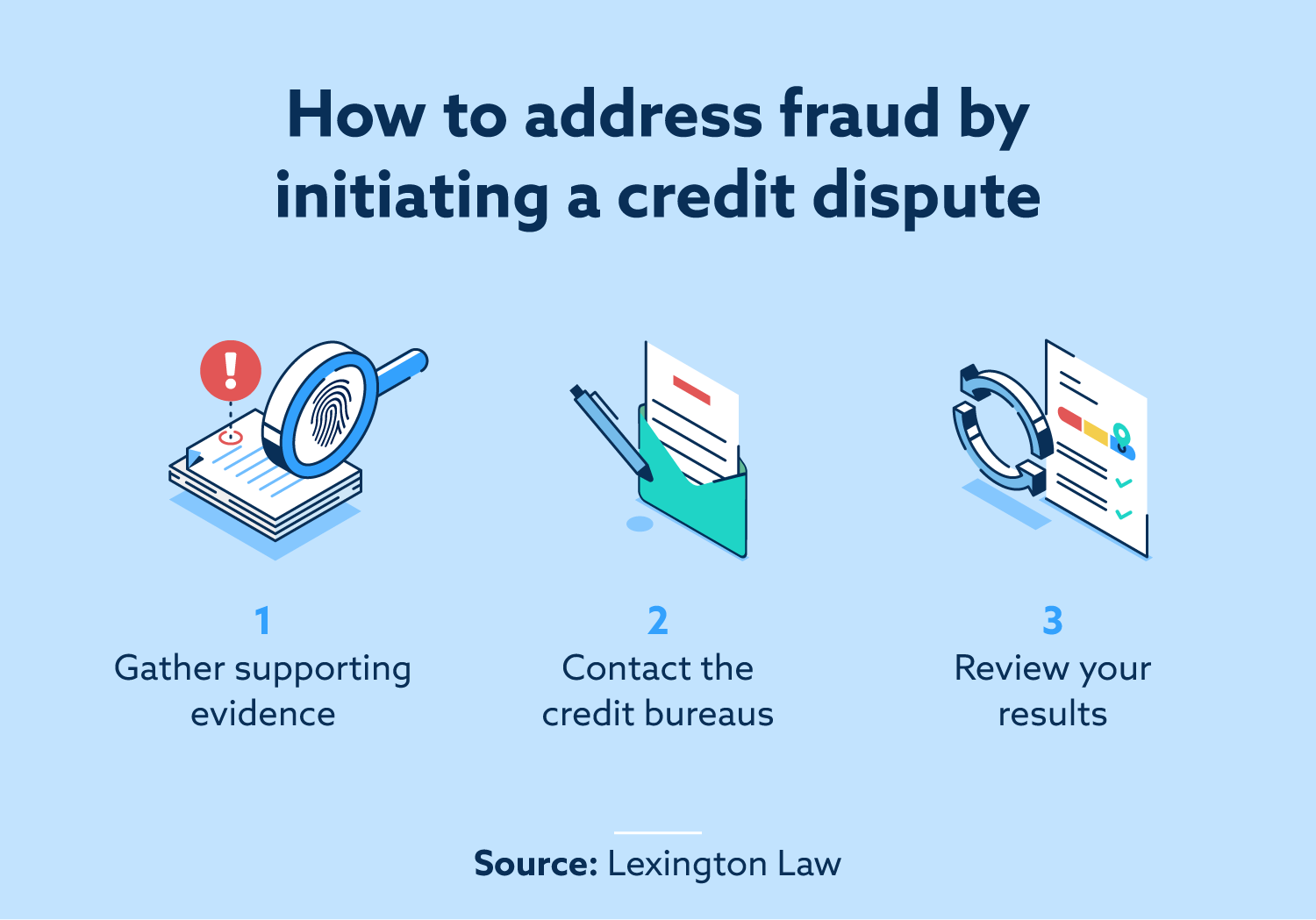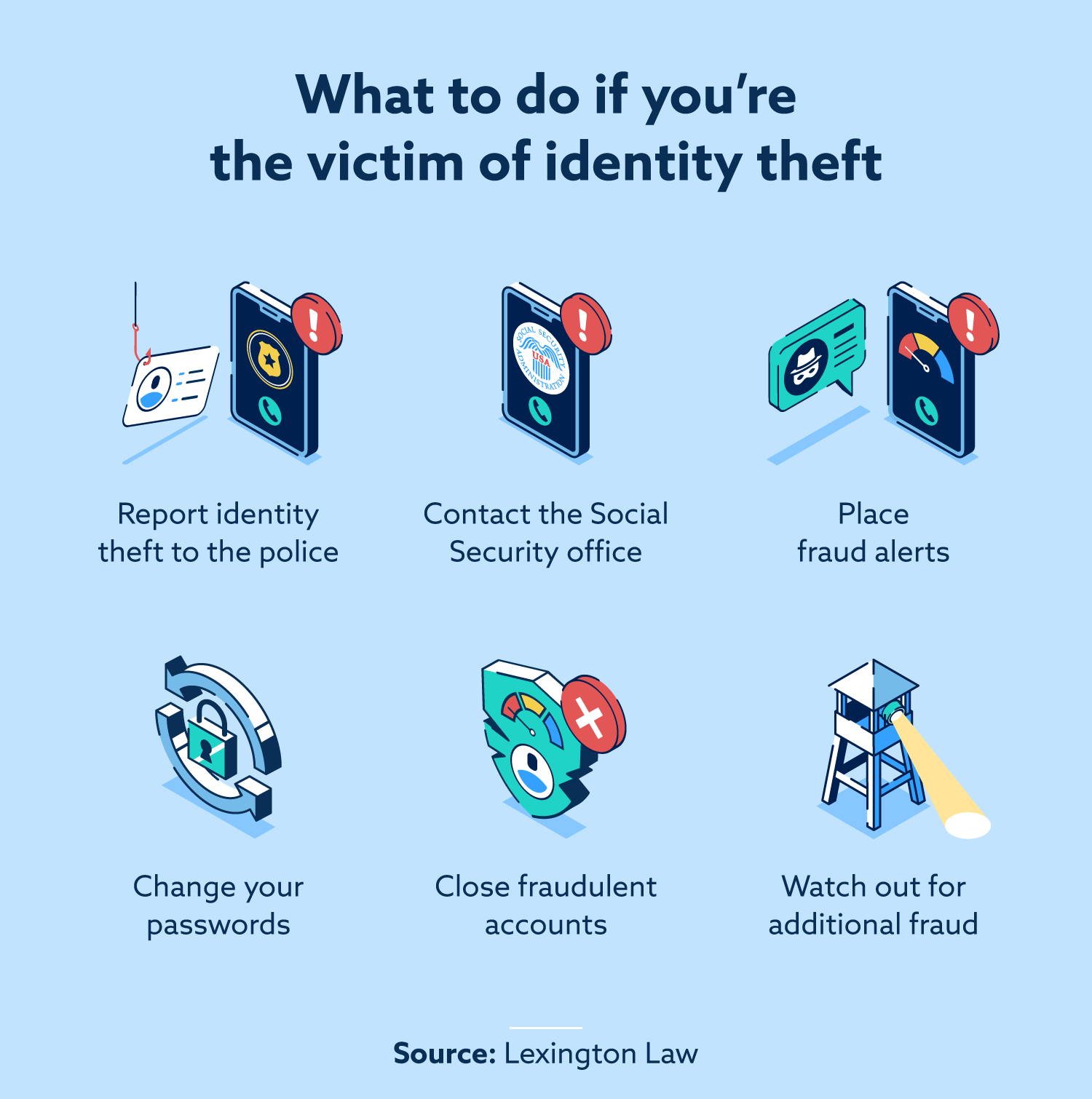
The information provided on this website does not, and is not intended to, act as legal, financial or credit advice. See Lexington Law’s editorial disclosure for more information.
You can remove fraud from your credit report by filing a credit dispute to have the information removed.
If you’re wondering how to remove fraud from your credit report, it’s as simple as filing a credit dispute to have the information removed. Initiating a credit dispute requires you to send a letter to one or more credit bureaus, which are the companies that report your credit history. Fortunately, the process is very straightforward, though it can be helpful to have professional support, especially since you may be the victim of identity theft if someone has opened an account in your name.
After you notice a fraudulent account on your credit report, you’ll want to make sure you pull credit reports from the other credit bureaus as well. Since the three credit bureaus—TransUnion®, Experian® and Equifax®—don’t always report the same information, you’ll need to see whether the fraudulent account is reported elsewhere.
Ultimately, you should file a dispute with multiple credit bureaus if you see the fraudulent account on multiple reports.
Below, we’ll detail how to remove fraud on your credit report at all three credit bureaus and discuss what else you can do if you’re the victim of fraud or identity theft.
How to address fraud by initiating a credit dispute
The process of disputing fraudulent accounts on your credit report takes only three steps: gathering evidence, sending a letter and reviewing your results.

While we outline these steps below, you can review our in-depth guide to initiating a credit dispute for even more information.
1. Gather evidence about the fraudulent account
First, you may wish to contact the financial institution where the fraudulent account was opened. Try to get as much information as possible about when the account was opened and what information was used to impersonate you.
After you have more information, you may choose to ask them to close the account and let them know that you will be filing a dispute with the credit bureaus to have the account removed from your credit report.
Next, you’ll prepare to contact the credit bureaus.
2. Send a letter via certified mail to the credit bureaus
You may file a dispute online or over the phone, or by a letter sent by certified mail. You should keep in mind how long they have to respond—generally about 30 days to complete an investigation to determine if the account is fraudulent.
| Equifax | TransUnion | Experian | |
|---|---|---|---|
| Online | How to Dispute | Manage a Dispute | Dispute Online |
| Equifax PO Box 740256 Atlanta, GA 30374-0256 |
TransUnion LLC Consumer Dispute Center PO Box 2000 Chester, PA 19016 |
Experian PO Box 4500 Allen, TX 75013 |
You can refer to the sample letter provided by the Federal Trade Commission (FTC) to help you get started. Make sure to follow each bureau’s process carefully, and reach out to each bureau individually if the fraudulent account is listed on multiple credit reports.
3. Review your results
After the credit bureau completes its investigation, you should receive a communication with the results as well as a copy of your credit report. If the fraudulent account was removed, you may see an increase in your credit score.
In any case, disputing your credit report is just one thing you can do if you believe you’ve been the victim of fraud. Read on for a list of other actions to take if your identity has been stolen.
What to do after finding fraud on your credit report
In addition to filing a credit dispute, there are other actions you may want to take after finding a fraudulent account on your credit report.

Consider some of the following action items after discovering a fraudulent account on your report.
- Report identity theft to the police. Get a police report about your identity theft. You can potentially use documentation from this report in your credit dispute. You may also wish to report the identity theft to the FTC using their online form.
- Contact the Social Security Administration. Report a misused Social Security number and work with the department to determine next steps.
- Place a fraud alert with each credit bureau. A fraud alert makes it more difficult for anyone to open new accounts in your name.
- Change your passwords and other login information. Update the passwords for your email address as well as any financial or government institutions.
- Work with companies to close accounts and remove charges. Call any company where a fraudulent account was opened and work with them to remove charges and close the accounts.
- Look out for fraud in other places. You may have issues with your bank account, cell phone, utility company, landlord, investment accounts or government benefits that you need to follow up on.
Identity theft can be a pervasive problem, but with persistence and support, you will be able to recover good standing and mitigate the damage to your credit and your life. While filing a credit dispute is generally a straightforward process, it can be complicated when dealing with fraudulent accounts. If you need additional support working to repair your credit and getting fraudulent accounts removed, contact the credit repair consultants at Lexington Law Firm for their expertise in the dispute process.
Note: Articles have only been reviewed by the indicated attorney, not written by them. The information provided on this website does not, and is not intended to, act as legal, financial or credit advice; instead, it is for general informational purposes only. Use of, and access to, this website or any of the links or resources contained within the site do not create an attorney-client or fiduciary relationship between the reader, user, or browser and website owner, authors, reviewers, contributors, contributing firms, or their respective agents or employers.
